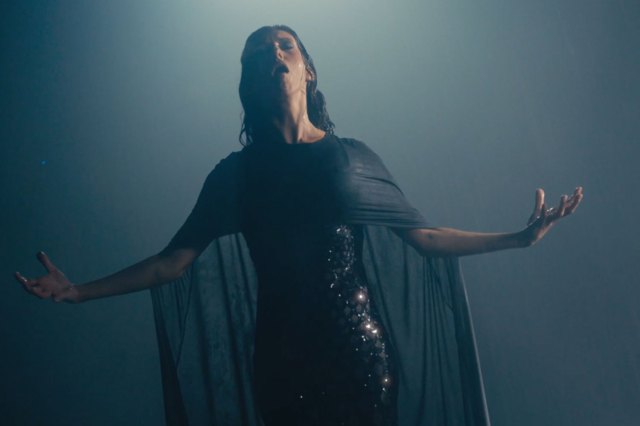After the Act at New Diorama Theatre review – Breach’s verbatim musical tackles Section 28
Billy Barrett’s production continues until 1 April

Breach’s new musical After the Act couldn’t be more timely – and not just for its delivery on the 20th anniversary of the repeal of Section 28, the laws which for 15 years in England and Wales effectively outlawed the “promotion” (read: mention) of homosexuality in state schools.
Mostly verbatim, an interviewee’s comments as well as photo exhibitions, featuring transgender and non-binary people as well as London Trans Pride, in the New Diorama’s foyer accompanying the show, allow Breach to be unequivocal in highlighting how the current fearmongering panic over trans people is the legacy of this hate. This implication would run under the entire show regardless, but it’s still welcome. At one of the recent London vigils for murdered trans teenager Brianna Ghey, a speaker paid tribute to Lucy Meadows, a teacher whose suicide after the Daily Mail outed her directly fills in the gap between the history covered in this musical and our present-day climate for trans people.
It’s not as raucous as previous Breach musical Joan of Leeds, a horny heretical “am-dram” treat, but it’s as clear-eyed in its anger as It’s True, It’s True, It’s True, their reanimation of the trial of baroque painter Artemisia Gentileschi’s rapist (both of which were New Diorama Theatre commissions). Another piece of documentary theatre, it roves non-chronologically through the years to explore the climate in this country which gave birth to Section 28, as well as the suffocating silence it instilled in a generation of young people and educators living under it.
It’s particularly refreshing so long (the entire first act!) is spent on establishing how the bill came to pass, taking in the furore over gently inclusive picturebook Jenny lives with Eric and Martin and the antics of incensed parents’ rights groups in Haringey casting a dad as a “folk hero for innocents”. It’s a great period for feats of lesbian fury: the show doesn’t quite reach the chaotic glee of its opening again, pitching the aptly-named newsreader Sue Lawley against invading protestors during the 6 O’Clock News, but time’s also devoted to the women who abseiled into the House of Lords at the passing of the bill, and the massive demonstration in Manchester (which featured speeches by actors Sue Johnston and Steven Parry).
MPs warble “Disgusting!” at each other, PE kits are donned in fraught changing rooms, a teacher lets a student in need down out of her own fear of being dobbed in, after they spot each other in a gay club. Ellice Stevens (co-artistic director and writer alongside Billy Barrett, who directs here) has a sparkly turn in a crunchy wig as Thatcher, decrying a perceived “unalienable right to be gay”, causing her supporters to faint at the mere approach of her handshake. At its most still and spoken, with successive, painful testimony from those who grew up under Section 28, it takes its time and feels considered.
Stevens, EM Williams, Tika Mu’tamir and Zachary Willis are a cohesive and appealling conduit for this history, playing across genders and ages mostly by only altering accents. At its danciest in the first act, Sung Im Her’s choreography is fun, but non-distinctive, leaving the stage not feeling full. Sometimes a singer winds down into a looping, silent gesture like video footage glitching, but this feels like a placeholder, not characteristic of the musical’s sound or aesthetic more largely. There’s a great harrowing point where Williams recounts a story of conversion prayer while skipping with a rope, but other players are often confined to simple repetitive movements or politely sultry stroking of each other while one sings.
The words come first, yes, but as is the danger with some verbatim musicals, the music meanders, as if needing the actors to cram all the words in, at the expense of a memorable rhythm, not quite allowing for punchlines to land their punches musically. Afterwards, it’s hard to remember individual songs instead of a slightly hurried blur. A couple of songs blithely reeling off homophobic slurs don’t hurt or offend, but do together feel a bit dramatically redundant. Besides being one of the more engaging options of getting across a hell of a lot of information about Section 28, as a musical After the Act doesn’t seem otherwise aesthetically settled, or suited to its subject matter.
Video projection by Zakk Hein creates collages at the sides of the stage, often featuring sensationalist headlines. AIDS as either an incoming punishment or real threat figures large in memories of the time, and we’re shown the ghastly, John Hurt-narrated public health campaign on TV, almost reminiscent of Derek Jarman’s Blue. There’s great colour from Jodie Underwood’s lighting, matching the performers’ boxy suits, designed by Lizzy Leech. Musicians Frew (also the composer and musical director) and Ellie Showering are ensconced at the top of a towering DJ column, bouncily scoring with dynamism and much synth.
It might not be the most assured musical on currently, but it’s a good testament to resistance, alive and kicking.












